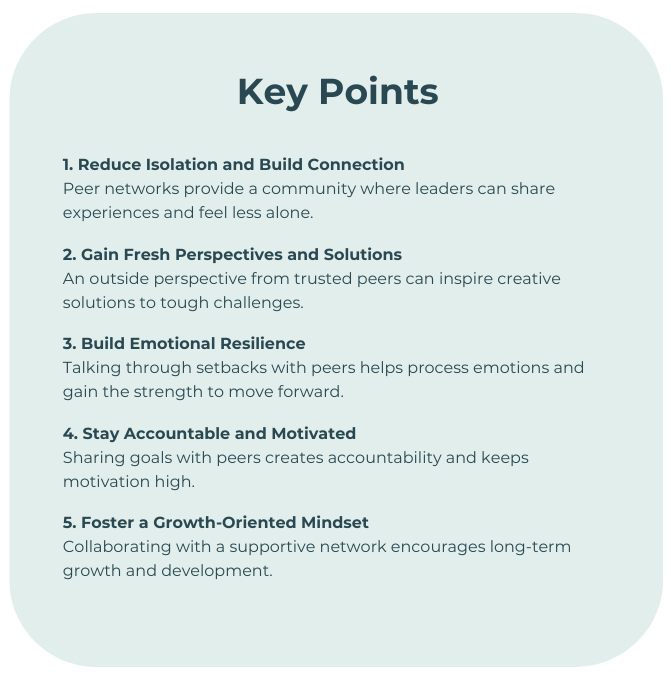Building Resilience Through Peer Support: Essential Networks for Leaders
What to Consider When Reading
How can peer support reduce isolation and help you gain new perspectives as a leader?
What steps can you take to start building a peer support network that aligns with your goals?
Leadership can be incredibly rewarding—but it can also feel isolating at times. The pressure to make the right decisions, maintain composure under stress, and support your team can weigh heavily. That’s why peer support is a game-changer. Building a network of like-minded leaders who understand the challenges you face can help you strengthen your resilience, gain fresh perspectives, and feel less alone in your leadership journey.
Peer support isn’t just about having someone to vent to—it’s about creating a space where you can share experiences, learn from others, and develop new strategies for facing challenges. Let’s explore why peer support is essential for leaders and how to build your own network to boost resilience and well-being.
Why Peer Support Matters for Leaders
1. It Reduces Isolation and Builds Connection
Leadership can feel lonely, especially when you’re carrying the weight of tough decisions. A peer support network offers a sense of connection and community, helping you realize that you’re not alone in your experiences.
When you connect with other leaders, you gain access to shared wisdom and learn that many of the challenges you face are common. This shared experience reduces feelings of isolation and reminds you that you have a support system to lean on.
Checklist for Reducing Isolation:
Schedule regular check-ins with peers or mentors.
Join leadership-focused groups or forums.
Participate in leadership workshops or masterminds.
Be open to sharing your experiences with trusted peers.
2. It Provides Fresh Perspectives and Creative Solutions
When you’re deep in a challenging situation, it’s easy to get stuck in your own thinking patterns. Peer support offers an outside perspective that can spark creative solutions you might not have considered.
For example, a peer might share how they navigated a similar situation, inspiring you to try a different approach. These fresh perspectives can help you tackle problems with renewed energy and confidence.
Checklist for Seeking Fresh Perspectives:
Ask peers how they’ve handled similar challenges.
Be open to feedback, even when it’s tough to hear.
Share your problem clearly and invite input.
Take notes and reflect on suggestions later.
3. It Boosts Emotional Resilience
Resilience isn’t about never feeling stressed—it’s about bouncing back and adapting in the face of challenges. Peer support plays a critical role in this process by providing a safe space to process setbacks, celebrate wins, and gather strength to move forward.
When you talk through difficult experiences with someone who understands, you’re better equipped to process emotions and gain the clarity needed to keep going. This emotional resilience helps you stay grounded and focused, even during tough times.
Checklist for Building Emotional Resilience:
Reflect on your setbacks with peers—what did you learn?
Share your successes to celebrate progress.
Focus on long-term growth, not short-term outcomes.
Encourage your peers to practice resilience alongside you.
4. It Helps You Stay Accountable and Motivated
A strong peer network isn’t just supportive—it can also help you stay on track with your goals. Whether it’s developing a new leadership skill, tackling a major project, or staying committed to self-care, peers can hold you accountable and keep you motivated.
Imagine you’ve set a goal to improve your work-life balance. Sharing that goal with your network can give you the extra push to prioritize it, knowing that your peers will check in on your progress.
Checklist for Staying Accountable:
Share your goals with trusted peers.
Set regular follow-ups to track progress.
Celebrate milestones together.
Be honest about challenges and ask for support.
Quick Poll: What’s the Biggest Benefit of Peer Support for You?
What do you value most in a peer support network?
A) Emotional resilience and connection
B) Fresh perspectives and creative solutions
C) Accountability and motivation
D) Shared experiences and advice
Vote now and see how others benefit from peer support!
How to Build Your Own Peer Support Network
Creating a meaningful peer support network doesn’t happen overnight, but with a little effort, you can build relationships that will serve you for years to come. Here are some tips to get started:
1. Identify the Right People
Look for peers who share your values and understand your challenges. These might be leaders in your industry, colleagues from leadership programs, or even friends who hold leadership roles.
Checklist for Identifying Your Network:
Seek people who inspire and challenge you.
Prioritize trust and mutual respect.
Diversify your network for broader perspectives.
Focus on quality over quantity.
2. Create Regular Opportunities to Connect
Consistency is key when it comes to peer support. Make an effort to connect regularly, whether it’s through coffee chats, video calls, or group discussions.
Checklist for Staying Connected:
Set recurring meetings with your network.
Use digital tools like Slack or Zoom for easy communication.
Rotate who leads the discussion to keep things fresh.
Be intentional about making time for these connections.
3. Practice Vulnerability and Active Listening
Peer support works best when you’re open and honest about your experiences. Practice vulnerability by sharing your challenges, and listen actively when others share theirs.
Checklist for Vulnerable Conversations:
Share both successes and struggles.
Avoid giving advice unless it’s requested.
Listen without interrupting.
Show empathy and encouragement.
4. Be Willing to Give and Receive Support
Peer support is a two-way street. Be willing to offer your own advice and encouragement, and don’t hesitate to ask for help when you need it. The more you invest in these relationships, the more you’ll get out of them.
Checklist for Balanced Support:
Offer thoughtful feedback and encouragement.
Ask for help when you’re feeling stuck.
Recognize and appreciate your peers’ contributions.
Celebrate each other’s growth and wins.
Wrapping Up: The Power of Peer Support for Resilient Leadership
Leadership doesn’t have to be a solo journey. By building a peer support network, you’ll gain the tools, insights, and encouragement needed to stay resilient and lead with confidence. Whether it’s reducing isolation, gaining fresh perspectives, or staying accountable, peer support is one of the most powerful resources a leader can have.
Take time to invest in your network, practice vulnerability, and stay connected—you’ll be amazed at the difference it makes in your leadership and well-being. And remember, you’re not just building resilience for yourself—you’re also contributing to the growth and success of everyone in your network.
Take the First Step Toward your Well-Being
At The Mental Game, we know that navigating life’s challenges requires more than just determination—it requires the right support and strategies tailored to your unique needs. Our team of seasoned professionals is dedicated to helping you build the mental resilience and skills necessary to excel, no matter what life throws your way.
Visit The Mental Game to learn more about our services and schedule your FREE consultation today and take the first step toward a healthier, more resilient mind.

